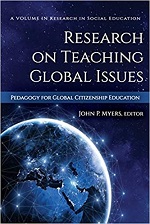Posts com a Tag ‘Journal of International Social Studies (JISS)’
Research on teaching global issues: Pedagogy for global citizenship education – MYERS (JISS)
John Myars. Florida State University .
 MYERS, J. P. (Ed.). Research on teaching global issues: Pedagogy for global citizenship education. Information Age Publishing, 2020. Resenha de: SAPERSTEIN, Evan. Journal of International Social Studies, v.10, n.3, p. 102-104, 2020.
MYERS, J. P. (Ed.). Research on teaching global issues: Pedagogy for global citizenship education. Information Age Publishing, 2020. Resenha de: SAPERSTEIN, Evan. Journal of International Social Studies, v.10, n.3, p. 102-104, 2020.
The recent novel coronavirus (COVID-19) pandemic has brought a number of urgent global issues to the fore, including public health, economic development, and universal education. Addressing these issues requires increased international collaboration, research, and instruction. In recent decades, global citizenship education (GCE) has sought to foster the very cross-cultural awareness and cooperation needed to solve pressing global challenges. As an increasingly important and timely discipline, GCE continues to be a source of growing scholarship.
Research on Teaching Global Issues: Pedagogy for Global Citizenship Education is the latest look at critical global issues and the need for related education. It is a topical read for educational stakeholders (teachers, administrators, curriculum writers, policymakers) trying to navigate the pedagogical priorities of an increasingly globalized world, particularly now in light of COVID-19. Edited by John Myers, Research on Teaching Global Issues serves as a guide for incorporating pressing global issues in curricula and classrooms, be they issues of public health, sustainability, poverty, hunger, gender equality, or education.
Research on Teaching Global Issues comprises two parts. The first (Chapters 2-4) considers “the educational contexts and policies that shape how global issues are taught in schools” (p. 7). The second (Chapters 5-9) covers “case studies of global issues in classrooms and schools” (p. 8). In the introductory chapter, Myers provides helpful context and frames the book’s raison d’être: “to bring the worlds of youth interest and engagement with global issues in closer alignment with the democratic purposes of schooling in a global age” (p. 3). Myers accordingly stresses that schools and teachers prepare students to become engaged citizens through the critical examination (e.g., pedagogy debates and discussions in a democratic classroom) of global issues.
In Chapter 2, Yemini, Goren, and Tibbitts undertake an ambitious quantitative network analysis of scholarship concerning GCE and teacher education. Focusing on scholarly literature from 2006 to 2017, the authors identify four main clusters: “subject areas and disciplines”; “globalization and culture”; “education for environmental sustainability”; and “language learning” (p. 16). While observing an increased scholarly interest in these fields, they recognize the need for more research on GCE and teacher education.
In Chapter 3, Shultz, Pillay, Karsgaard, and Pashby use a deliberative pedagogy to engage students from various nations in remote and in-person instruction as part of a UNESCO initiative. Notably, the participating students viewed global citizenship through the prism of equity and justice (i.e., interconnection and complexity; diversity and difference; community, relationality, and compassion). The authors emphasize the importance of student input (16- to 18-year-olds) in designing and developing GCE curricula, while providing a critical look at mainstream GCE views.
In Chapter 4, Rapoport conducts a content analysis of U.S. state social studies standards and related curricular documents that refer to an inquiry-based framework (C3 Framework). While more states over the past decade have incorporated global citizenship (or similar terminology) in their social studies standards, Rapoport rightly concludes that there is insufficient emphasis on transformative critical GCE.
In Chapter 5, Bourn reviews how certain schools in the UK, in conjunction with the Fairtrade Foundation’s Award Program, address fairtrade through classroom activities and school clubs. Despite the potential limitations of such instruction (e.g., providing simplistic causes or answers to unjust trade practices or poverty), Bourn finds that teaching about fairtrade generates student interest, engenders empathy, and develops a global mindset based on awareness and social justice.
In Chapter 6, Cruz, Ellerbrock, Denney, and Viera spotlight InsideART, an innovative University of South Florida program for secondary social studies and visual art teachers incorporating contemporary art into their curriculum (e.g., using open-access material) and teaching global issues. Through workshop evaluations and teacher interviews, the authors conclude that collaboration with museum curators/educators, college professors, and global artists can increase awareness of global and social issues, make these issues relevant for students, and provide more instructional flexibility despite implementation obstacles.
In Chapter 7, Baildon and Bott conduct a revealing case study at a public secondary school in Singapore that adopted a GCE curriculum focused on experiential and student-centered learning. According to the authors, the school does provide more opportunities for students to discuss and analyze global issues by emphasizing values (e.g., caring, empathy) and volunteerism, despite national curricular constraints. However, with insufficient critical inquiry of certain global issues, the authors correctly point out the need for a more transformative GCE curriculum.
In Chapter 8, Bardo advances a thought-provoking conceptual model that serves to foster cultural self-awareness. Through a simulation, he demonstrates how experiential learning activities can help students separate themselves from their cultural positioning and develop a more informed global outlook.
In Chapter 9, Chong argues, persuasively, why the Hong Kong Special Administrative Region should make GCE an integral part of school curricula and teaching methods, in response to recent government efforts to promote national identity over the teaching of global issues. He also provides conceptual, curricular, and pedagogical considerations for teachers tasked with preparing active global citizens.
Despite the range of topics covered in the book, three common themes emerge. First, teachers need more professional development and training to help students critically examine global issues. Second, schools need to embrace critical and transformative GCE, including analyzing non-Western perspectives from the Global South and examining sources of inequality and poverty. This also involves rewriting curricula, designing frameworks, and implementing new pedagogical approaches consistent with forward-thinking GCE values. Third, schools should groom justice-oriented citizens prepared to take action to solve urgent global challenges. This requires students not only to exercise basic civic duties locally or nationally but to become global agents of change.
In sum, Research in Teaching Global Issues spans far-reaching GCE-related topics ranging from teacher education to student engagement, from curriculum frameworks to an interdisciplinary whole-school approach, from school-university partnerships to innovative global studies programs, and from new conceptual models to novel pedagogical practices. For aspiring and established GCE scholars, the book offers insight into recent related literature and an opportunity to consider and analyze new perspectives. For teachers, department chairs, and directors of curriculum and instruction, the book offers lessons from on-point case studies. And, for scholar-practitioners, it is a how-to guide to translate research into practice and reflect on the multi-purpose value of GCE.
This book methodically examines the complexities associated with teaching such a broad discipline. The coherence and flow of each chapter stand out. The careful scrutiny of GCE curriculum and pedagogy also warrants note. Research in Teaching Global Issues serves as a springboard for future research. More attention should be given to both pre-service and in-service GCE training. More studies should look at pioneering schools already engaged in critical inquiry of GCE. And, in a post-COVID-19 world, more should connect with like-minded GCE educators committed to helping students create a better world.
Evan Saperstein – Is an adjunct professor at William Paterson University and a high school social studies teacher in New Jersey. His research interests include global citizenship education, experiential learning, service-learning, curriculum development, and pedagogy. E-mail: sapersteine@wpunj.edu
[IF]

